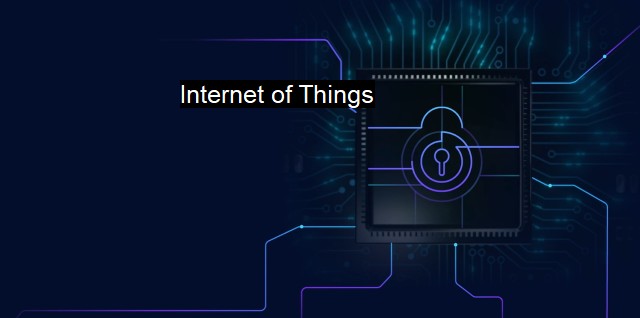What are Internet of Things?
The Growing Importance of Cybersecurity for the Internet of Things (IoT)
The Internet of Things (IoT) is a rapidly evolving technology that promises to revolutionize the world in many aspects. It refers to the ever-growing network of physical devices, buildings, and other items, embedded with electronics, software, sensors, and networking capabilities that enable them to collect, upload, and exchange data. With appropriate access to the internet, these devices can communicate with each other and share information without requiring human intervention.The IoT has found utility in a wide range of applications such as smart homes, wearable technology, smart cities, connected cars, and intelligent manufacturing. These are just but a few areas where IoT is presently transforming human interactions with the digital world.
Before one is quick to acknowledge the merits of IoT, they must become aware of its implications particularly in terms of its vulnerabilities and practical solutions. IoT is a double-edged technological advance that brings significant benefits in terms of efficiency, but also provides substantial exposure to adverse cybersecurity issues.
In terms of cybersecurity, hacking of IoT devices is a significant threat being used to steal data from targeted users. Considering the vast amount of data managed and transmitted by these devices, they present an enticing catch for hackers. IoT devices can be turned into a gateway for hackers into the interconnected ecosystem of these devices, leading to the numerous reported cases of data breaches.
Lack of standard security measures in the IoT technology architecture itself remains one of the significant reasons contributing to its vulnerability. Many IoT devices are designed to prioritize the quality of service and functionality at the expense of security functions such as data encryption and strong authentication. Many devices also lack secure booting mechanisms and use default usernames and passwords, making them susceptible to security leaks and potential misuse.
Antivirus software gains new importance in the IoT context. Antivirus is a program designed to prevent, detect, and remove viruses and other malicious software (malware) from computer systems. In the IoT context, antivirus software could be used to secure not just computers but also IoT devices themselves from virus attack, safeguarding the device functionality and data integrity and enhancing security.
Proof-of-concept malware targeting IoT devices have emerged, with several damaging attacks reported. The infamous Mirai botnet attack of 2016 exploited vulnerabilities in IoT devices such as digital cameras and internet routers, creating a botnet that launched high-profile DDoS attacks. Traditional antivirus modules such as Writers, Implementors, Transformers (WITs) have not yet been optimized to cope with the specific requirements of IoT devices, hence the need for highly customized IoT antivirus solutions.
Despite these challenges, technology experts are continuously researching and developing advanced measures to give antivirus solutions and moderation against the risks brought about by IoT. Many antivirus vendors have expanded their scope past computers and smartphones to include IoT devices, offering customizable options such as updating passwords, enabling reliable two-factor authentication, and constant software updates. Device fingerprinting, identity and access management techniques, network segmentation are few other solutions that are gaining traction as effective ways to increase the level of security in IoT.
IoT marks the frontier of the advancing digital world where devices can work smarter rather than harder. To fully gain from this technology users, developers, regulators, and indeed all stakeholders must understand the cybersecurity implications that come with IoT. In doing so, they can address vulnerabilities, adopt standard security measures, and harness the power of antivirus software to protect against harmful threats and foster advancement of IoT.

Internet of Things FAQs
What is the Internet of Things (IoT)?
The Internet of Things (IoT) is a technology concept that connects everyday devices, equipment, and appliances to the internet. This enables these devices to communicate and transmit data, allowing users to remotely control or monitor them.How does IoT relate to cybersecurity?
IoT devices are often targets of cyberattacks, which can exploit vulnerabilities in their software or weak passwords to gain access to sensitive information or cause harm. As more IoT devices are deployed, it becomes increasingly difficult to secure them all, making cybersecurity a critical concern for IoT deployments.Do IoT devices require antivirus protection?
Yes, IoT devices should be protected by antivirus software to prevent malware and other threats from compromising their security. Antivirus software can detect and block suspicious activities, scan for vulnerabilities, and prevent unauthorized access to the device or its data.What are some best practices for securing IoT devices?
Some best practices for IoT device security include keeping software up to date, using strong passwords, disabling unnecessary features and services, encrypting data transmissions, and restricting access to the device's network. It's also important to monitor device activity for any signs of suspicious behavior and to have a plan in place to respond to security incidents.| | A | | | B | | | C | | | D | | | E | | | F | | | G | | | H | | | I | | | J | | | K | | | L | | | M | |
| | N | | | O | | | P | | | Q | | | R | | | S | | | T | | | U | | | V | | | W | | | X | | | Y | | | Z | |
| | 1 | | | 2 | | | 3 | | | 4 | | | 7 | | | 8 | | |||||||